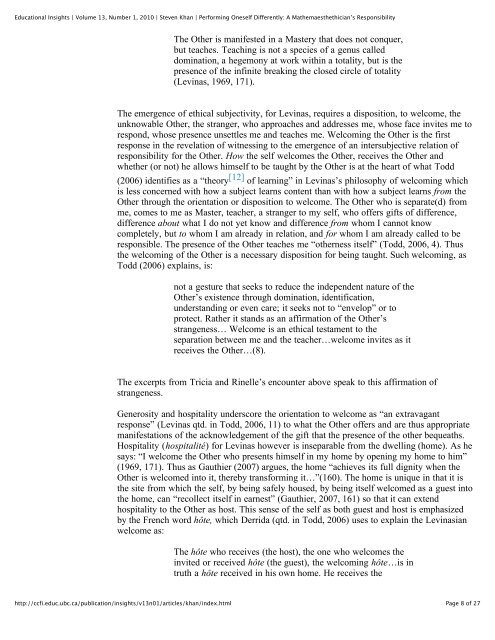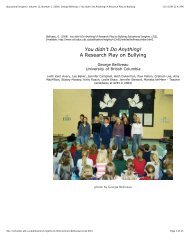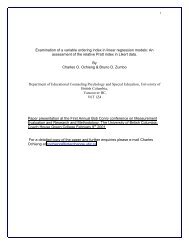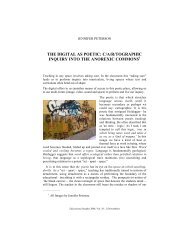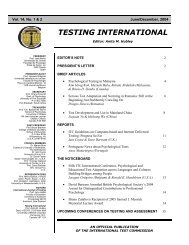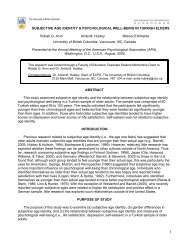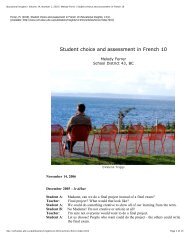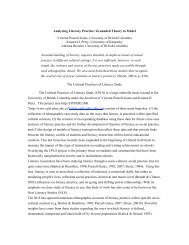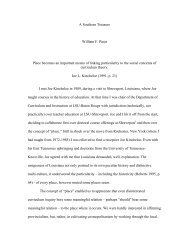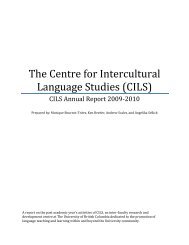Printer Version - University of British Columbia
Printer Version - University of British Columbia
Printer Version - University of British Columbia
You also want an ePaper? Increase the reach of your titles
YUMPU automatically turns print PDFs into web optimized ePapers that Google loves.
Educational Insights | Volume 13, Number 1, 2010 | Steven Khan | Performing Oneself Differently: A Mathemaesthethician’s Responsibility<br />
http://ccfi.educ.ubc.ca/publication/insights/v13n01/articles/khan/index.html<br />
The Other is manifested in a Mastery that does not conquer,<br />
but teaches. Teaching is not a species <strong>of</strong> a genus called<br />
domination, a hegemony at work within a totality, but is the<br />
presence <strong>of</strong> the infinite breaking the closed circle <strong>of</strong> totality<br />
(Levinas, 1969, 171).<br />
The emergence <strong>of</strong> ethical subjectivity, for Levinas, requires a disposition, to welcome, the<br />
unknowable Other, the stranger, who approaches and addresses me, whose face invites me to<br />
respond, whose presence unsettles me and teaches me. Welcoming the Other is the first<br />
response in the revelation <strong>of</strong> witnessing to the emergence <strong>of</strong> an intersubjective relation <strong>of</strong><br />
responsibility for the Other. How the self welcomes the Other, receives the Other and<br />
whether (or not) he allows himself to be taught by the Other is at the heart <strong>of</strong> what Todd<br />
(2006) identifies as a “theory [12] <strong>of</strong> learning” in Levinas’s philosophy <strong>of</strong> welcoming which<br />
is less concerned with how a subject learns content than with how a subject learns from the<br />
Other through the orientation or disposition to welcome. The Other who is separate(d) from<br />
me, comes to me as Master, teacher, a stranger to my self, who <strong>of</strong>fers gifts <strong>of</strong> difference,<br />
difference about what I do not yet know and difference from whom I cannot know<br />
completely, but to whom I am already in relation, and for whom I am already called to be<br />
responsible. The presence <strong>of</strong> the Other teaches me “otherness itself” (Todd, 2006, 4). Thus<br />
the welcoming <strong>of</strong> the Other is a necessary disposition for being taught. Such welcoming, as<br />
Todd (2006) explains, is:<br />
not a gesture that seeks to reduce the independent nature <strong>of</strong> the<br />
Other’s existence through domination, identification,<br />
understanding or even care; it seeks not to “envelop” or to<br />
protect. Rather it stands as an affirmation <strong>of</strong> the Other’s<br />
strangeness… Welcome is an ethical testament to the<br />
separation between me and the teacher…welcome invites as it<br />
receives the Other…(8).<br />
The excerpts from Tricia and Rinelle’s encounter above speak to this affirmation <strong>of</strong><br />
strangeness.<br />
Generosity and hospitality underscore the orientation to welcome as “an extravagant<br />
response” (Levinas qtd. in Todd, 2006, 11) to what the Other <strong>of</strong>fers and are thus appropriate<br />
manifestations <strong>of</strong> the acknowledgement <strong>of</strong> the gift that the presence <strong>of</strong> the other bequeaths.<br />
Hospitality (hospitalité) for Levinas however is inseparable from the dwelling (home). As he<br />
says: “I welcome the Other who presents himself in my home by opening my home to him”<br />
(1969, 171). Thus as Gauthier (2007) argues, the home “achieves its full dignity when the<br />
Other is welcomed into it, thereby transforming it…”(160). The home is unique in that it is<br />
the site from which the self, by being safely housed, by being itself welcomed as a guest into<br />
the home, can “recollect itself in earnest” (Gauthier, 2007, 161) so that it can extend<br />
hospitality to the Other as host. This sense <strong>of</strong> the self as both guest and host is emphasized<br />
by the French word hôte, which Derrida (qtd. in Todd, 2006) uses to explain the Levinasian<br />
welcome as:<br />
The hôte who receives (the host), the one who welcomes the<br />
invited or received hôte (the guest), the welcoming hôte…is in<br />
truth a hôte received in his own home. He receives the<br />
Page 8 <strong>of</strong> 27


